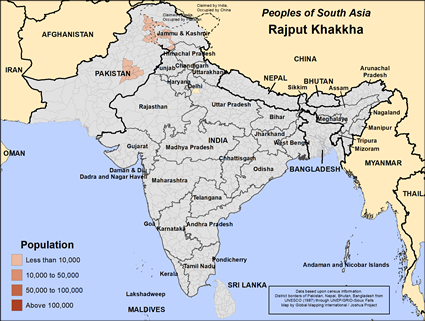Starting in the 5th century, there was a massive attack by the White Huns in what is now northern and northwestern India and Pakistan. About a century later the reigning Hindu-based Gupta Empire broke up, leaving the Subcontinent vulnerable to Muslim invaders from the north. As time went on, invaders took over land and integrated with the settled peoples of this region. Tribal leaders, especially those involved with defense, were accepted as Kshatriya, the second highest varna (major categories of castes) in Hindu society, while their followers became the fourth and lowest varna. Priests became the Brahmins, the highest of the four varnas.
Rajputs, who were part of the Kshatriya varna, became politically important in the seventh century. From around 800 AD Rajput dynasties ruled northern India. Petty Rajput kingdoms were the main obstacle to Muslim domination of the Hindu subcontinent. For hundreds of years Rajputs were the warriors who defended kingdoms from invaders and conquered others. When possible, Rajputs settled down, became nobles, and enjoyed the lives of landed gentry.
Over a period of a couple hundred years, invaders penetrated the Rajput wall that protected the Subcontinent. Some Rajput subgroups converted to Islam during this time. The British Empire put an end to the Moghul Empire, but they recruited Rajputs into their military units. The Rajputs have kept alive their proud history of conquest, bravery and military might.
Rajputs are concentrated in India's northwestern state of Rajasthan, though there are Rajputs all over India. Pakistan also has Rajput communities, mostly in Punjab Province. The Khakkha Rajputs speak Saraiki.
Though Khakkha Rajputs are still in the armed forces or own land, many have moved on to other livelihoods. Some work as small businessmen or wage laborers.
Khakkha Rajputs try to marry their daughters into clans of higher rank than their own. Rajputs often marry their daughters off while they are very young.
Though Rajputs were once Hindu, some converted to Islam starting in the early 12th century. That includes the Khakkha Rajput community. Sufi Muslim missionaries were instrumental in winning these Hindus to Islam, though others converted to Islam for political reasons. Conversion to Islam continued into the 19th century when the British were gaining power in the Subcontinent. It is important to note that conversions happen at the group level; entire Rajput clans converted to Islam, not individuals. Those who want to see Rajputs won to Jesus Christ should remember this.
Rajputs who have embraced Islam usually retain common social practices such as having their wives secluded (purdah). Those who are devout do their five daily ritual prayers, give alms to the poor, and go on the pilgrimage (haj) to Mecca, Saudi Arabia. Muslims from all communities come together on Friday afternoons to pray and hear a sermon at local mosques.
Khakkha Rajputs are admired in South Asia for their historical and military accomplishments. Rajputs presently are going through something of an identity crisis. They can no longer depend on land ownership or military careers, especially with the Indian government reserving prestigious jobs for underprivileged castes. Believers with the right skills can help them during this time of transition.
Pray for Rajput communities to increasingly grow in awareness of Jesus, his life and his sacrifice for them.
Pray the Lord will give Khakkha Rajput leaders spiritual hunger, then satisfy that hunger with Christ.
Pray these people will understand the value of becoming part of God's royal family.
Pray for Holy Spirit led humility for all Rajput communities to fall at the feet of the King of kings.
Pray for Khakkha Rajput families to accept the abundant blessings and guidance offered only by Jesus Christ.
Scripture Prayers for the Rajput Khakkha in Pakistan.
https://en.wikipedia.org/wiki/Category:Rajput_clans
http://induhistory.blogspot.com/p/rajput-history.html
https://www.britannica.com/topic/Rajput
https://en.wikipedia.org/wiki/Rajput
http://allrajputyouthwing.weebly.com/muslim-rajputs-
| Profile Source: Joshua Project |











